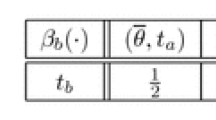Abstract
In certain finite extensive games with perfect information, Cristina Bicchieri (1989) derives a logical contradiction from the assumptions that players are rational and that they have common knowledge of the theory of the game. She argues that this may account for play outside the Nash equilibrium. She also claims that no inconsistency arises if the players have the minimal beliefs necessary to perform backward induction. We here show that another contradiction can be derived even with minimal beliefs, so there is no paradox of common knowledge specifically. These inconsistencies do not make play outside Nash equilibrium plausible, but rather indicate that the epistemic specification must incorporate a system for belief revision. Whether rationality is common knowledge is not the issue.
Similar content being viewed by others
References
Aumann, R.: 1995, ‘Backward Induction and Common Knowledge of Rationality’, Games and Economic Behavior 8, 6–19.
Aumann, R. and A. Brandenburger: 1991, ‘Epistemic Conditions for Nash Equilibrium’, Mimeo 91-042, Hebrew University and Harvard Business School.
Bacharach, M.: 1987, ‘A Theory of Rational Decision in Games’, Erkenntnis 27, 17–55.
Basu, K.: 1987, ‘Modeling Finitely-Repeated Games with Uncertain Termination’, Economics Letters 23, 147–151.
Basu, K.: 1990, ‘On the Non-Existence of a Rationality Definition for Extensive Games’, International Journal of Game Theory 19, 33–44.
Basu, K.: 1994, ‘The Travelers' Dilemma: Paradoxes of Rationality in Game Theory’, American Economic Review 84(2), 391–395.
Ben-Porath, E.: 1994, ‘Rationality, Nash Equilibrium and Backwards Induction in Perfect Information Games’, Mimeo, Northwestern University.
Bicchieri, C.: 1989, ‘Self-Refuting Theories of Strategic Interaction: A Paradox of Common Knowledge’, Erkenntnis 30, 69–85.
Bicchieri, C.: 1992, ‘Knowledge-Dependent Games: Backward Induction’, in Bicchieri and Dalla Chiara (Eds.), Knowledge. Belief. and Strategic Interaction, Cambridge Univ. Press.
Bicchieri C. and G. A. Antonelli: 1993, ‘Game-Theoretic Axioms for Local Rationality and Bounded Knowledge’, Paper presented at the Nobel Symposium on Game Theory at Björkborn Sweden, June 1993.
Binmore, K.: 1987, ‘Modeling Rational Players: I’, Economics and Philosophy 3, 179–214.
Bimore, K.: 1995, ‘Backward Induction and Rationality’, Discussion Paper 95-10, University College London.
Bonanno, G.: 1991, ‘The Logic of Rational Play in Games of Perfect Information’, Economics and Philosophy 7, 37–65.
Bonanno, G.: 1994, ‘Review of Cristina Bicchieri's Rationality and Coordination’, Forthcoming in Economics and Philosophy.
Elster, J.: 1991, The Cement of Society. Cambridge University Press.
Gärdenfors, P.: 1988, Knowledge in Flux, MIT Press, Cambridge, Mass.
Gul, F.: 1995, ‘Rationality and Coherent Theories of Strategic Behavior’, Forthcoming in Journal of Economic Theory.
Hintikka, J.: 1962, Knowledge and Belief, Cornell University Press.
Kreps, D., P. Milgrom, J. Roberts, and R. Wilson: 1982, ‘Rational Cooperation in the Finitely-Repeated Prisoners' Dilemma’, Journal of Economic Theory 27, 245–252.
Kuhn, H.: 1953, ‘Extensive Games and the Problem of Information’, Annals of Mathematics Studies 28, Princeton University Press.
Luce, D. and H. Raiffa: 1957, Games and Decisions, Wiley, New York.
McKelvey, R. and T. Palfrey: 1992, ‘An Experimental Study of the Centipede Game’, Econometrica 60, 803–836.
Neyman, A.: 1985, ‘Bounded Complexity Justifies Cooperation in the Finitely Repeated Prisoners' Dilemma’, Economics Letters 19, 227–29.
Pettit, P. and R. Sugden: 1989, ‘The Backward Induction Paradox’, The Journal of Philosophy 4, 169–182.
Reny, P.: 1988, ‘Rationality, Common Knowledge and the Theory of Games’, Ph.D. thesis, Department of Economics, Princeton University.
Reny, P.: 1993, ‘Common Belief and the Theory of Games with Perfect Information’, Journal of Economic Theory 59, 257–274.
Rosenthal, R.: 1981, ‘Games of Perfect Information, Predatory Pricing and the Chain-Store Paradox’, Journal of Economic Theory 25, 92–100.
Selten, R.: 1978, ‘The Chain-Store Paradox’, Theory and Decision 9, 127–159.
Sugden, R.: 1991, ‘Rational Choice: A Survey of Contributions from Economics and Philosophy’, The Economic Journal 101, 751–785.
Author information
Authors and Affiliations
Rights and permissions
About this article
Cite this article
Dufwenberg, M., Lindén, J. Inconsistencies in extensive games. Erkenntnis 45, 103–114 (1996). https://doi.org/10.1007/BF00226373
Received:
Issue Date:
DOI: https://doi.org/10.1007/BF00226373




